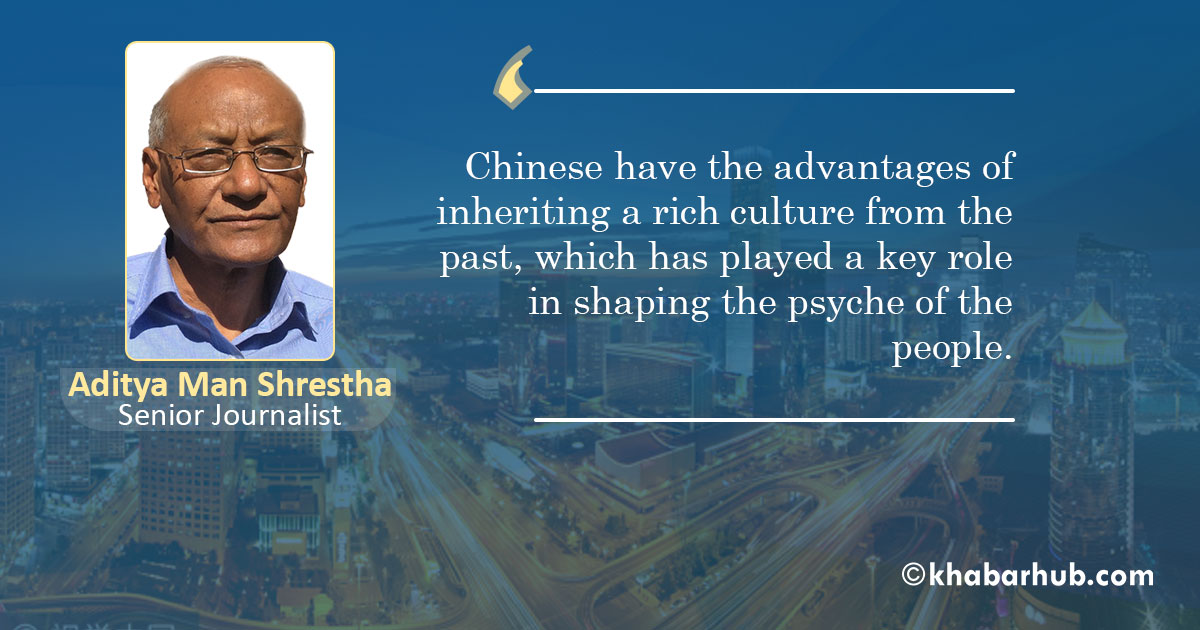Irrespective of the size of the country and its people, China has made three frontiers of development — health, peace, and awareness. In a big country like China with multitudes of people, it is a stupendous task to do so. Physically, China has developed miraculously, it is found peaceful and stable and it inherits a culture that is favorable for a correct national awareness.
As far as the health of China as a nation is concerned, it has clearly demonstrated a high capability of achieving it. The tremendous economic development it has attained in recent decades has catapulted it in a new position in the world order. China has become the second biggest economy by overtaking Japan. At the present rate of progress, it is anticipated that China will grow as the biggest economy in the world within 20 to 30 years. It has already overtaken Japan in the size of the economy and left Germany behind as the biggest exporting country in the world. China has indeed the biggest population of more than 1.3 billion. It has, therefore, by far the biggest challenge of feeding its population and keeping them healthy.
With food, shelter, education, health, and jobs made available in plenty, China has gained a strong national health condition. In physical terms, it has secured remarkable achievement.
In the 30-year period of Chairman Mao-Tse-Tung’s leadership from 1949-79, Chinese achieved self-sufficiency in food supply and defense. China has inherited a system of traditional medicine that helped maintain the good health of the people on a mass scale. Chinese food is famous for preventing obeseness. It is the introduction of junk food that created a problem of overweight among the new generation.
Added to it, there are taijichuang, acupressure and acupuncture methods that are invaluable for people’s good health. In another 30-year period of Deng Tsiao-Ping, the country built up a huge industrial complex resulting in distributing cheap goods all over the world. In the second period marked by 4 modernizations, Chinese students went abroad for studies in thousands, who, on their return, contributed a lot in the modernization spree. With food, shelter, education, health, and jobs made available in plenty, China has gained a strong national health condition. In physical terms, it has secured remarkable achievement.
In terms of peace and security also, China has no problem. It has adopted a one-party communist rule with full political grip. Although there is a lot of criticism of its system from the democratic and free societies, it has been successful in maintaining peace and order in the country necessary for accelerated progress in the economic field. Compared to other open societies, Chinese society is considered pretty closed as far as its political, administrative and judicial decision-making process is concerned. However, it has not barred any country of the world to establish and carry out normal relations with China. In fact, China is moving closer to many countries in all continents of the world.
Confucianism has made a great contribution in building up a national character of the people making them fully aware of their duty and responsibility towards the state and the society.
The Chinese government is taken to task quite often for suppressing human rights of its people. The government, instead of denying it blatantly, concedes that it would take some time before it can liberalize its system of governance and grant more and more freedom to the people. In defense of the existing system of strict control, the Chinese leaders explain that it is an awesome task to keep more than a billion people united, well fed, and well managed.
They don’t want to take a chance with a new system that is feared to put the country back in national chaos and disintegration as in the past before the communist rule. Similarly, China, having the highest number of neighbors compared to other countries of similar size and strength, has maintained an enormous army and arsenal for national defense. In respect of peace and security, internally as well as externally, China looks in a comfortable position.
While it has helped the people to develop self-respect and discipline, it has also given a definite shape to the statecraft. In that sense, there is unity of inner awareness among the ruled and the rulers on the role of the state.
In terms of mass awareness, China is endowed with a strong feeling of nationalism. They were seen fighting against each other for political domination but they did not differ in their views on important issues. That is clearly seen in the issues of Taiwan, which is considered a part of China notwithstanding two independent governments running from Beijing and Taipei. Both claim to be the legitimate government of total China although none of them has any control over the other.
Chinese have also the advantages of inheriting a rich culture from the past, which has played a key role in shaping the psyche of the people. Confucianism has made a great contribution in building up a national character of the people making them fully aware of their duty and responsibility towards the state and the society. Similarly, it has made a great impact on the system of government and governance over the centuries. While it has helped the people to develop self-respect and discipline, it has also given a definite shape to the statecraft. In that sense, there is unity of inner awareness among the ruled and the rulers on the role of the state.
However, the pace of material development is feared to leave the spiritual values behind. China, in the process of becoming a superpower, is likely to grow arrogant to the detriment of greater welfare of the world. So it is necessary to revive the ancient values of the Chinese cultures based on Taoism and Buddhism to keep the country cool, collected and conciliatory.









Comment